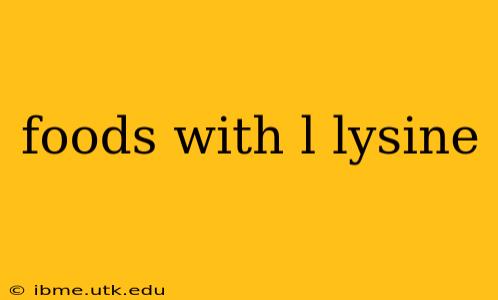Lysine is an essential amino acid, meaning our bodies can't produce it, so we must obtain it through our diet. This vital nutrient plays a crucial role in various bodily functions, including calcium absorption, collagen formation, and hormone and enzyme production. A deficiency can lead to several health problems, highlighting the importance of including lysine-rich foods in your diet. This comprehensive guide explores the best sources of lysine and answers common questions about this essential nutrient.
What are the best food sources of lysine?
Many foods contain lysine, but some are particularly rich sources. Generally, animal products are excellent sources, while plant-based sources often contain lower amounts. Here’s a breakdown of some of the best foods to include in your diet for a good lysine intake:
- Meat: Red meat (beef, lamb, pork), poultry (chicken, turkey), and organ meats (liver, kidney) are all exceptionally high in lysine.
- Fish and Seafood: Salmon, tuna, cod, and sardines are excellent sources of lysine, offering additional health benefits from omega-3 fatty acids.
- Eggs: Eggs are a complete protein source, providing a good amount of lysine alongside other essential amino acids.
- Dairy Products: Cheese, milk, and yogurt are good sources of lysine, particularly hard cheeses like cheddar and parmesan.
- Soy Products: While not as high as animal products, soybeans, tofu, and tempeh contain a decent amount of lysine. However, it's important to note that the bioavailability of lysine in soy can be lower than in animal-based sources.
- Legumes: Beans (kidney, black, pinto) and lentils contain some lysine, but often in smaller quantities compared to animal-based sources. Combining legumes with grains (like rice and corn) can improve the overall amino acid profile.
What foods are low in lysine?
Understanding which foods are low in lysine is just as important as knowing the rich sources. Foods typically low in lysine include:
- Grains: Many grains like corn, wheat, and rice are relatively low in lysine. This is why combining grains with lysine-rich legumes is a common dietary strategy for vegetarians and vegans.
- Nuts and Seeds: While nutritious, nuts and seeds generally contain lower amounts of lysine.
Is lysine found in vegetables?
While not as abundant as in animal products, some vegetables do contain lysine. However, the quantities are often significantly lower than in meat, fish, or eggs. Dark leafy greens and some cruciferous vegetables contain some lysine, but they shouldn't be relied upon as the primary source.
How much lysine do I need daily?
The recommended daily allowance of lysine varies depending on age, sex, and activity level. It's best to consult with a healthcare professional or registered dietitian to determine your individual needs. They can help you create a balanced diet that ensures you're getting enough lysine and other essential nutrients.
Can I get enough lysine from a vegetarian or vegan diet?
While obtaining sufficient lysine on a vegetarian or vegan diet requires more planning, it is certainly achievable. Combining various plant-based protein sources, such as legumes and grains, is key to ensuring a complete amino acid profile. Careful meal planning and potentially incorporating soy products can help meet the daily lysine requirement. Consulting a nutritionist specializing in plant-based diets is highly recommended.
What happens if I don't get enough lysine?
Lysine deficiency is relatively rare in developed countries with diverse diets. However, a deficiency can lead to several issues, including:
- Fatigue and weakness: Lysine plays a role in energy production.
- Anemia: Lysine is involved in iron absorption.
- Reproductive issues: Lysine is important for hormone production.
- Slowed growth in children: Lysine is crucial for growth and development.
- Hair loss: In some cases, lysine deficiency has been linked to hair loss.
It's important to note that these symptoms can also be caused by other factors, so if you experience them, it's crucial to see a doctor for proper diagnosis and treatment.
Conclusion: Prioritizing Lysine in Your Diet
Including a variety of lysine-rich foods in your daily diet is crucial for optimal health. While animal products are excellent sources, careful planning can ensure adequate lysine intake even on vegetarian or vegan diets. Remember to consult a healthcare professional for personalized dietary advice, especially if you have any concerns about your lysine intake or experience any symptoms related to a potential deficiency.
